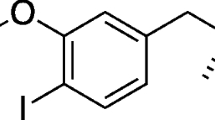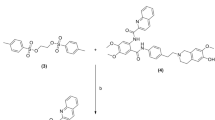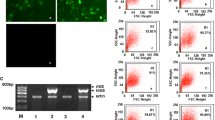Abstract
In vivo studies have demonstrated that pentavalent technetium-99m dimercaptosuccinic acid [99mTc-(V)-DMSA] may be a useful tumour imaging agent. Several studies have suggested that 99mTc-(V)-DMSA uptake may be related to the structural similarity between the 99mTc-(V)-DMSA core and the PO4 3– anion. As phosphate ions enter cells via NaPi cotransporters, we investigated whether 99mTc-(V)-DMSA uptake is mediated by NaPi cotransporters. 99mTc-(V)-DMSA and phosphate uptake kinetics were compared in three cancer cell lines (MCF-7, G152 and MG-63) under several conditions (with and without sodium and NaPi cotransporter inhibitor and at different pH). Determination of molecular NaPi cotransporter mRNA expression was performed by reverse-transcriptase polymerase chain reaction (Rt-PCR) assay. Results obtained in the presence of NaPi inhibitor, in sodium-free medium and at alkaline pH showed that 99mTc-(V)-DMSA accumulation is linked to NaPi cotransporter functionality. MCF-7 and G152 exhibited the same tracer uptake, whereas MG-63 showed the highest phosphate accumulation and the lowest 99mTc-(V)-DMSA uptake. These results were in accordance with mRNA NaPi expression, i.e. all cell lines expressed NaPi type III but MG-63 also co-expressed NaPi type I. The total level of NaPi cotransporter was highly correlated with phosphate accumulation, while the level of type III was related to 99mTc-(V)-DMSA uptake. We have demonstrated that 99mTc-(V)-DMSA uptake is specifically mediated by NaPi type III in cancer cells.




Similar content being viewed by others
References
Babbar A, Kashyap R, Chauhan UP. A convenient method for the preparation of99mTc-labelled pentavalent DMSA and its evaluation as a tumour imaging agent. J Nucl Biol Med 1991; 35:100–104.
Kashyap R, Babbar A, Sahai I, Prakash R, Soni NL, Chauhan UP. Tc-99m(V) DMSA imaging. A new approach to studying metastases from breast carcinoma. Clin Nucl Med 1992; 17:119–122.
Papantoniou V, Christodoulidou J, Papadaki E, Valotassiou V, Souvatzoglou M, Louvrou A, Feida H, Sotiropoulou M, Pampouras G, Michalas S, Zerva C. Uptake and washout of99mTcV-dimercaptosuccinic acid and 99mTc-sestamibi in the assessment of histological type and grade in breast cancer. Nucl Med Commun 2002; 23:461–467.
Hirano T, Otake H, Kazama K, Wakabayashi K, Zama A, Shibasaki T, Tamura M, Endo K. Technetium-99m(V)-DMSA and thallium-201 in brain tumor imaging: correlation with histology and malignant grade. J Nucl Med 1997; 38:1741–1749.
Lam ASK, Puncher MR, Blower PJ. In vitro and in vivo studies with pentavalent technetium-99m dimercaptosuccinic acid. Eur J Nucl Med 1996; 23:1575–1582.
Lam AS, Kettle AG, O’Doherty MJ, Coakley AJ, Barrington SF, Blower PJ. Pentavalent99Tcm-DMSA imaging in patients with bone metastases. Nucl Med Commun 1997; 18:907–914.
Ohta H, Tsuji T, Endo K, Fujita T, Konishi J, Kotoura Y, Yamamuro T. SPECT images using99mTc(V)-DMS in lung metastasis of osteosarcoma. Ann Nucl Med 1989; 3:37–40.
Yuksel D, Ilgan S, Arslan N, Ugur O, Ozturk E, Bayhan H. The role of Tc-99m (V) DMSA scintigraphy in the evaluation of superscan on bone scintigraphy. Clin Nucl Med 2000; 25:193–196.
Wulfrank DA, Schelstraete KH, Small F, Fallais CJ. Analogy between tumor uptake of technetium(V)-99m dimercaptosuccinic acid (DMSA) and technetium-99m-MDP. Clin Nucl Med 1989; 14:588–593.
Blower PJ, Singh J, Clarke SE. The chemical identity of pentavalent technetium-99m-dimercaptosuccinic acid. J Nucl Med 1991; 32:845–849.
Yokoyama A, Hata N, Horiuchi K, Masuda H, Saji H, Ohta H, Yamamoto K, Endo K, Torizuka K. The design of a pentavalent99mTc-dimercaptosuccinate complex as a tumor imaging agent. Int J Nucl Med Biol 1985; 12:273–279.
Horiuchi K, Saji H, Yokoyama A. pH sensitive properties of Tc(V)-DMS: analytical and in vitro cellular studies. Nucl Med Biol 1998; 25:689–695.
Horiuchi K, Saji H, Yokoyama A. Tc(V)-DMS tumor localization mechanism: a pH-sensitive Tc(V)-DMS-enhanced target/nontarget ratio by glucose-mediated acidosis. Nucl Med Biol 1998; 25:549–555.
Tannock IF, Rotin D. Acid pH in tumors and its potential for therapeutic exploitation. Cancer Res 1989; 49:4373–4384.
Wike-Hooley JL, Haveman J, Reinhold HS. The relevance of tumour pH to the treatment of malignant disease. Radiother Oncol 1984; 2:343–366.
Raghunand N, Mahoney B, van Sluis R, Baggett B, Gillies RJ. Acute metabolic alkalosis enhances response of C3H mouse mammary tumors to the weak base mitoxantrone. Neoplasia 2001; 3:227–235.
Fischer B, Muller B, Fischer KG, Baur N, Kreutz W. Acidic pH inhibits non-MHC-restricted killer cell functions. Clin Immunol 2000; 96:252–263.
Ghishan FK, Rebeiz R, Honda T, Nakagawa N. Characterization and expression of a novel Na(+)-inorganic phosphate transporter at the liver plasma membrane of the rat. Gastroenterology 1993; 105:519–526.
Li H, Xie Z. Molecular cloning of two rat Na+/Pi cotransporters: evidence for differential tissue expression of transcripts. Cell Mol Biol Res 1995; 41:451–460.
Hisano S, Haga H, Li Z, Tatsumi S, Miyamoto KI, Takeda E, Fukui Y. Immunohistochemical and RT-PCR detection of Na+-dependent inorganic phosphate cotransporter (NaPi-2) in rat brain. Brain Res 1997; 772:149–155.
Gupta A, Miyauchi A, Fujimori A, Hruska KA. Phosphate transport in osteoclasts: a functional and immunochemical characterization. Kidney Int 1996; 49:968–974.
Magagnin S, Werner A, Markovich D, Sorribas V, Stange G, Biber J, Murer H. Expression cloning of human and rat renal cortex Na/Pi cotransport. Proc Natl Acad Sci U S A 1993; 90:5979–5983.
Hilfiker H, Hattenhauer O, Traebert M, Forster I, Murer H, Biber J. Characterization of a murine type II sodium-phosphate cotransporter expressed in mammalian small intestine. Proc Natl Acad Sci U S A 1998; 95:14564–14569.
Kavanaugh MP, Kabat D. Identification and characterization of a widely expressed phosphate transporter/retrovirus receptor family. Kidney Int 1996; 49:959–963.
Kavanaugh MP, Miller DG, Zhang W, Law W, Kozak SL, Kabat D, Miller AD. Cell-surface receptors for gibbon ape leukemia virus and amphotropic murine retrovirus are inducible sodium-dependent phosphate symporters. Proc Natl Acad Sci U S A 1994; 91:7071–7075.
Johann SV, Gibbons JJ, O’Hara B. GLVR1, a receptor for gibbon ape leukemia virus, is homologous to a phosphate permease of Neurospora crassa and is expressed at high levels in the brain and thymus. J Virol 1992; 66:1635–1640.
Miller DG, Miller AD. A family of retroviruses that utilize related phosphate transporters for cell entry. J Virol 1994; 68:8270–8276.
Uckert W, Willimsky G, Pedersen FS, Blankenstein T, Pedersen L. RNA levels of human retrovirus receptors Pit1 and Pit2 do not correlate with infectibility by three retroviral vector pseudotypes. Hum Gene Ther 1998; 9:2619–2627.
Werner A, Dehmelt L, Nalbant P. Na+-dependent phosphate cotransporters: the NaPi protein families. J Exp Biol 1998; 201:3135–3142.
Beauchesne P, Bertrand S, Ng MJ, Christianson T, Dore JF, Mornex F, Bonner JA. Etoposide sensitivity of radioresistant human glioma cell lines. Cancer Chemother Pharmacol 1998; 41:93–97.
Westera G, Gadze A, Horst W. A convenient method for the preparation of99mTc(V)dimercaptosuccinic acid (99mTc(V)-DMSA). Int J Appl Radiat Isot 1985; 36:311–312.
Escoubet B, Djabali K, Amiel C. Adaptation to Pi deprivation of cell Na-dependent Pi uptake: a widespread process. Am J Physiol 1989; 256:C322–C328.
Fernandes I, Beliveau R, Friedlander G, Silve C. NaPO(4) cotransport type III (PiT1) expression in human embryonic kidney cells and regulation by PTH. Am J Physiol 1999; 277:F543–F551.
Shen MR, Wilkins RJ, Chou CY, Ellory JC. Anion exchanger isoform 2 operates in parallel with Na(+)/H(+) exchanger isoform 1 during regulatory volume decrease of human cervical cancer cells. FEBS Lett 2002; 512:52–58.
Clover J, Gowen M. Are MG-63 and HOS TE85 human osteosarcoma cell lines representative models of the osteoblastic phenotype? Bone 1994; 15:585–591.
Taichman RS, Reilly MJ, Emerson SG. Human osteosarcomas inhibit hematopoietic colony formation: partial reversal by antibody to transforming growth factor-beta 1. Bone 1997; 21:353–361.
Biber J, Custer M, Magagnin S, Hayes G, Werner A, Lotscher M, Kaissling B, Murer H. Renal Na/Pi-cotransporters. Kidney Int 1996; 49:981–985.
Acknowledgements
This work was supported by grants from the Ligue Nationale Contre le Cancer-Comité Départemental de la Loire. We thank Mr Saul for his help in the translation of the manuscript.
Author information
Authors and Affiliations
Corresponding author
Rights and permissions
About this article
Cite this article
Denoyer, D., Perek, N., Le Jeune, N. et al. Evidence that 99mTc-(V)-DMSA uptake is mediated by NaPi cotransporter type III in tumour cell lines. Eur J Nucl Med Mol Imaging 31, 77–84 (2004). https://doi.org/10.1007/s00259-003-1334-7
Received:
Accepted:
Published:
Issue Date:
DOI: https://doi.org/10.1007/s00259-003-1334-7




